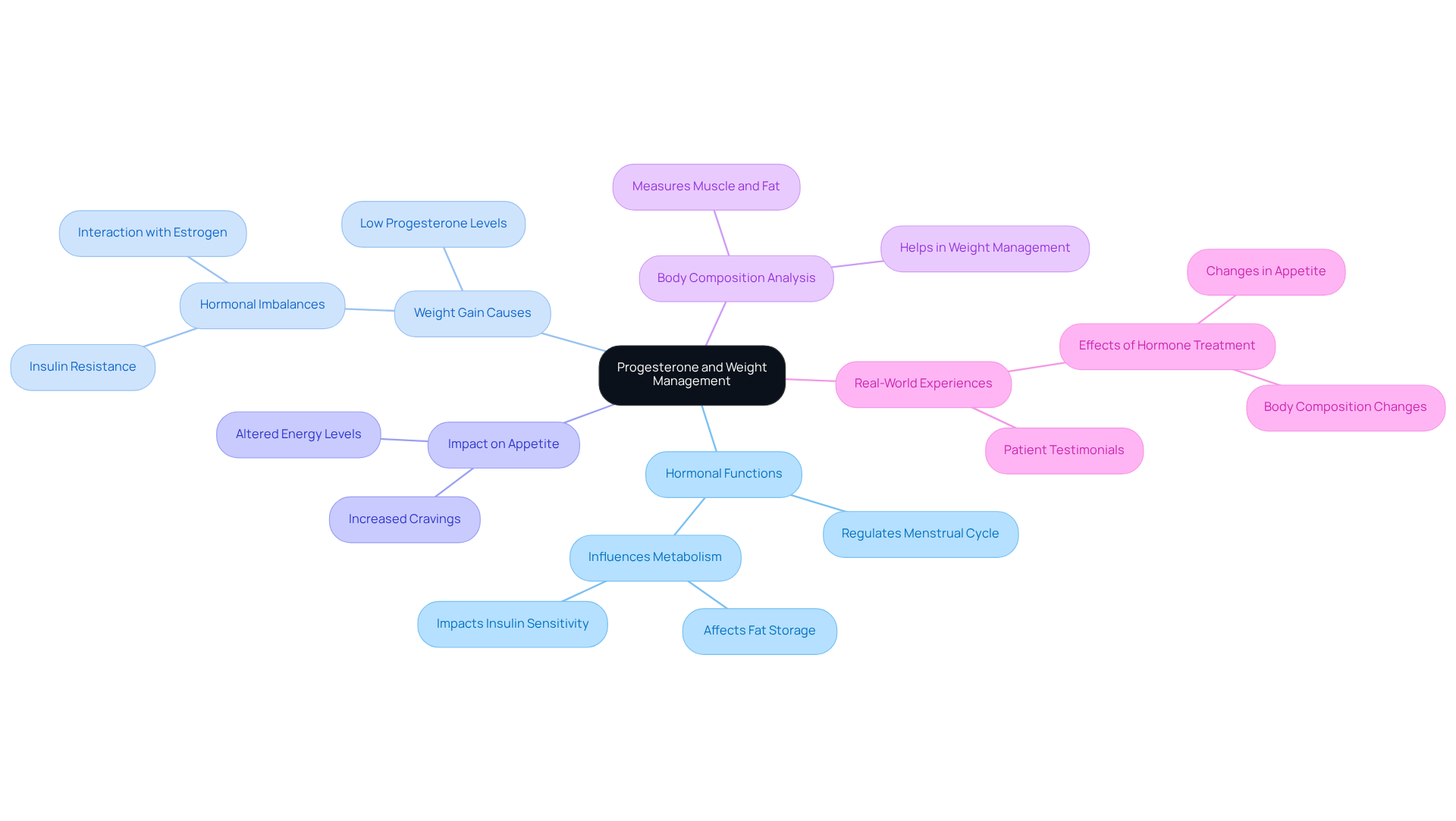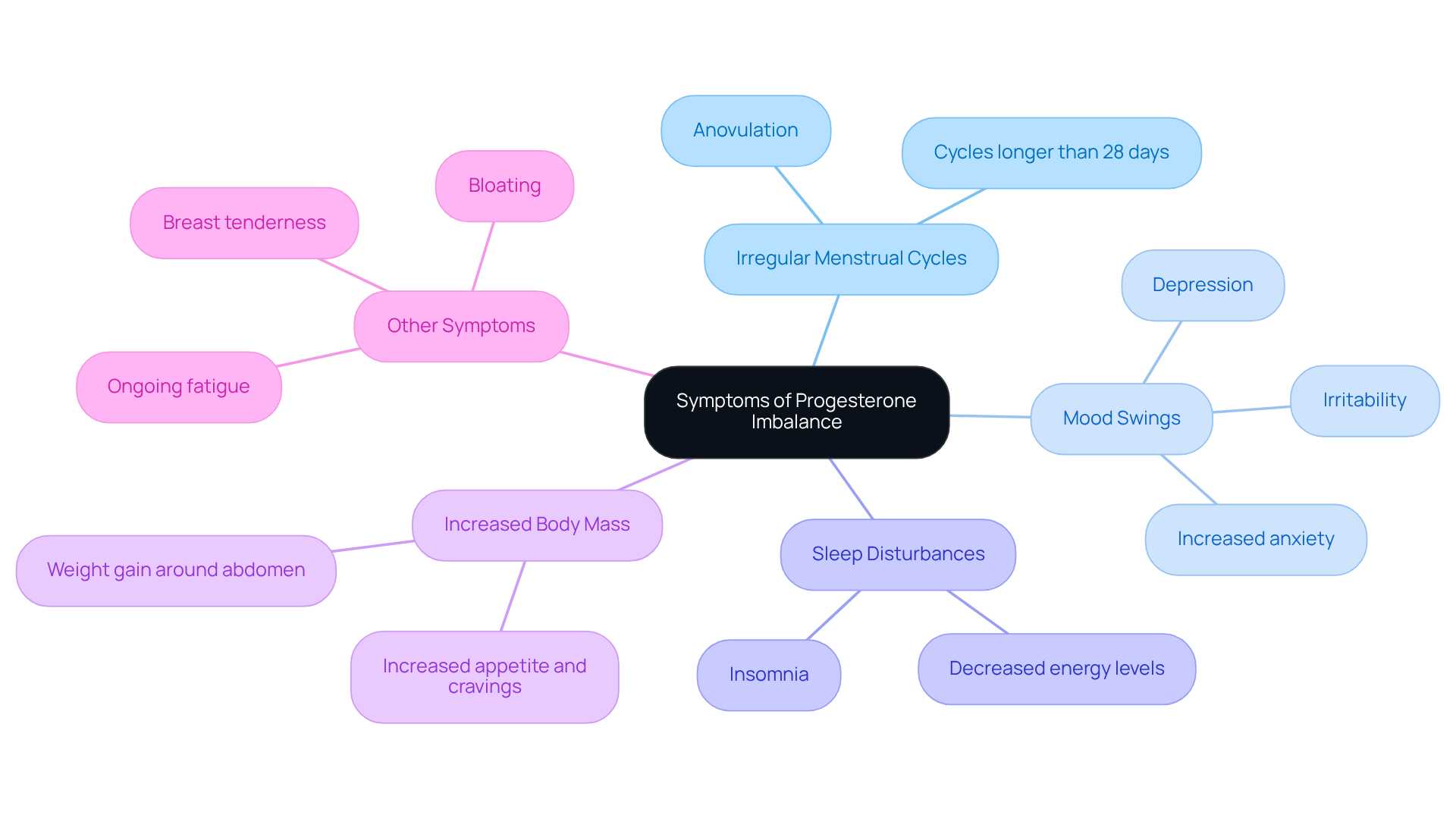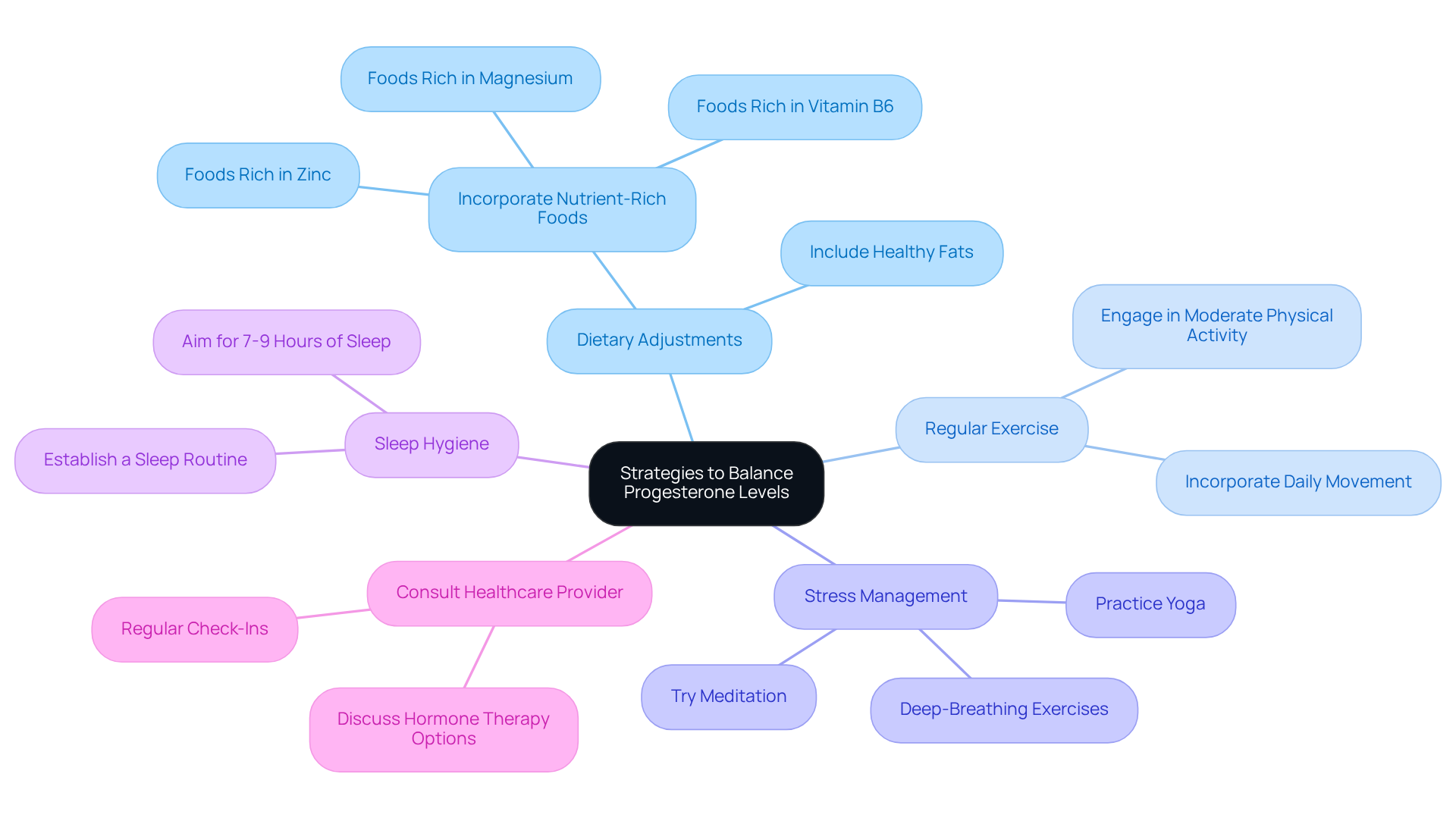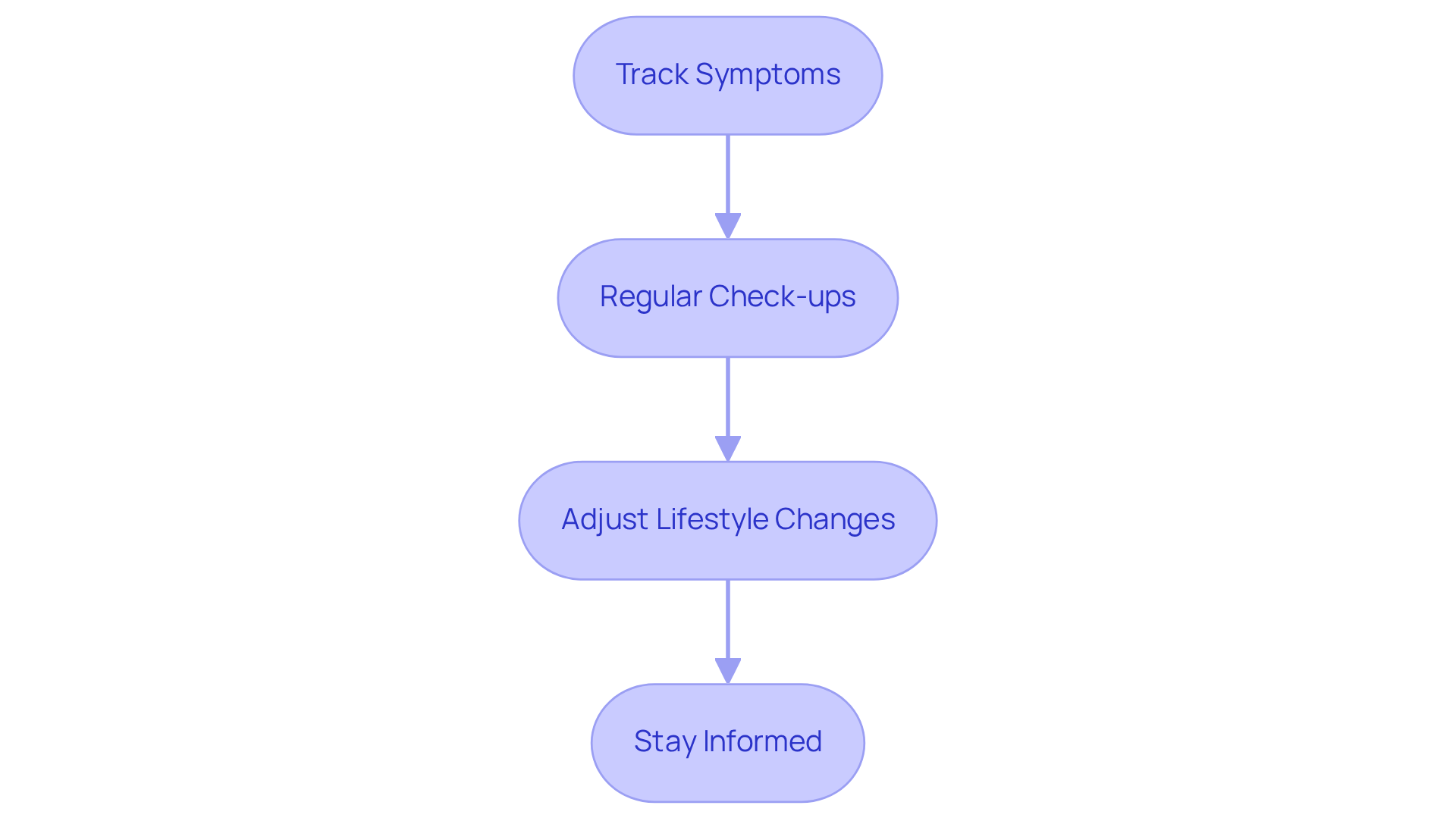Introduction
Navigating the complex relationship between hormones and weight management can feel overwhelming, but understanding it can open doors to achieving your health goals. Progesterone plays a crucial role in our metabolic processes; it not only influences how our bodies store fat but also impacts our appetite and energy levels. Many of us face challenges with hormonal imbalances, leading to the important question: how can balancing progesterone levels help us on our weight loss journey?
This guide explores the significant role of progesterone in weight management, offering practical strategies designed to empower you to take control of your body and health. Together, we can uncover ways to support your wellness journey, ensuring you feel informed and equipped to make positive changes. Let’s delve into how understanding and balancing progesterone can be a game-changer for your health.
Understand Progesterone and Its Role in Weight Management
Progesterone, primarily produced in the ovaries, plays a vital role in regulating various bodily functions, including the menstrual cycle and pregnancy. This hormone prepares the body for potential pregnancy after ovulation and significantly influences how we metabolize fats and carbohydrates. When hormone levels are low, it can lead to weight gain, particularly around the abdomen. This increase in mass often ties back to the interaction of hormones like estrogen and insulin, which can disrupt normal metabolic functions.
Many people experience hormonal imbalances, and statistics show that low levels of progesterone to lose weight can lead to weight gain for a significant portion of the population. For instance, women going through menopause frequently report an increase in abdominal fat due to declining hormone levels. By focusing on regulating these hormone levels, individuals may find that using progesterone to lose weight helps them manage their body mass effectively.
Progesterone to lose weight also influences appetite and fat storage by affecting metabolic rate and insulin sensitivity. When progesterone levels drop, the body may start to store more fat as an energy reserve, which is why some people consider using progesterone to lose weight, especially in anticipation of possible pregnancy. This hormonal imbalance can lead to increased cravings and altered energy levels, making it more challenging to control body mass, but understanding how progesterone to lose weight can help is crucial.
At Woodlands Wellness & Cosmetic Center, we understand the importance of body composition analysis, which measures muscle, fat, and water in the body. This approach allows for a more accurate assessment of health and body management, helping individuals reduce body fat while increasing muscle. By combining hormone balance, particularly progesterone to lose weight, with body composition analysis, women can achieve smarter, healthier, and more sustainable weight management. Real-world experiences highlight how this hormone impacts appetite and fat storage. For example, women undergoing hormone treatment often notice changes in their appetite and body composition as their hormone levels are adjusted. Endocrinologists emphasize that understanding progesterone to lose weight is crucial for effective body mass management strategies. They note that while hormone supplementation can aid in managing body composition by addressing imbalances, it’s essential to be mindful of potential side effects, such as bloating and mood swings.
In summary, maintaining balanced hormone levels is key to effectively managing body mass, as it directly influences appetite, fat distribution, and overall metabolic health. By focusing on body composition analysis rather than just the number on the scale, individuals can gain a clearer understanding of their health and work towards achieving their wellness goals together.

Identify Symptoms of Progesterone Imbalance
Hormonal imbalances can manifest in various ways, significantly impacting a woman’s quality of life. You might notice:
- Irregular menstrual cycles that stretch beyond the typical 28-day rhythm
- Mood swings that lead to heightened anxiety and irritability
- Sleep disturbances, like insomnia
- An increase in body mass, particularly around the abdomen, often linked to hormonal changes
- Other common symptoms, including breast tenderness, bloating, and ongoing fatigue
Recognizing these signs is crucial, as they may indicate that hormone levels are not where they should be. For instance, research suggests that low hormone levels can trigger increased appetite and cravings for carbohydrates, leading some to explore the use of progesterone to lose weight, making weight management even more challenging.
Keeping a symptom diary can be a helpful tool for tracking these changes. By documenting shifts in mood, menstrual regularity, and physical symptoms, you can provide valuable insights to your healthcare provider when seeking treatment. This proactive approach empowers you to advocate for your health and explore potential hormonal assessments with your doctor.
Together, we can navigate these challenges. Remember, you’re not alone in this journey. By understanding your body and its signals, you can take meaningful steps toward achieving balance and wellness.

Implement Strategies to Balance Progesterone Levels
Balancing progesterone levels can feel challenging, but there are supportive strategies you can embrace to help you on this journey:
-
Dietary Adjustments: Have you considered incorporating foods rich in zinc, magnesium, and vitamin B6? These nutrients are known to support hormone production. Think about adding leafy greens, nuts, seeds, and whole grains to your meals. They can make a real difference!
-
Regular Exercise: Engaging in moderate physical activity can be a wonderful way to help regulate hormone levels. Plus, it’s a great way to reduce stress, which we know can contribute to hormonal imbalances that affect progesterone to lose weight. Just a little movement each day can uplift your mood and well-being.
-
Stress Management: Stress can take a toll on your hormones, so finding ways to manage it is crucial. Consider trying yoga, meditation, or deep-breathing exercises. These practices can help lower cortisol levels, which is important for balancing hormones like progesterone to lose weight.
-
Sleep Hygiene: Are you getting enough rest? Quality sleep is essential for hormonal balance. Aim for 7-9 hours each night to help your body recharge and restore itself.
-
If you find that lifestyle changes aren’t enough, don’t hesitate to consult a healthcare provider for advice on using progesterone to lose weight. They can discuss hormone therapy options with you, including bioidentical hormones or other treatments tailored to your unique needs.
Remember, you’re not alone in this. Together, we can explore these options and find what works best for you!

Monitor Progress and Adjust Your Approach
To effectively monitor your progress in balancing progesterone levels, consider these supportive steps:
-
Track symptoms: Keep a detailed log of your symptoms, noting changes in mood, weight, and menstrual cycle regularity, as understanding these can be important when considering progesterone to lose weight. This practice not only helps you identify patterns but also allows you to assess how effective your strategies are.
-
Regular Check-ups: Schedule consistent appointments with your healthcare provider to evaluate hormone levels through blood tests. Regular monitoring is crucial. Studies show that hormonal imbalances can significantly impact overall health and well-being. Blood serum testing is recognized as the gold standard for hormone evaluation, providing accurate measurements of hormone concentrations in the bloodstream. As Karen Clark wisely states, “Blood serum testing is often considered the gold standard of hormone testing.”
-
Adjust Lifestyle Changes: Be open to altering your diet, exercise routine, or stress coping strategies based on your observations and test results. Personalization is key; what works for one person may not be effective for another.
Using progesterone to lose weight can be an effective strategy. Stay informed: Continuously educate yourself about hormonal health and the role of progesterone to lose weight in weight control. New research and strategies are always emerging, and staying informed empowers you to make the best choices for your health. Engaging with healthcare professionals who emphasize the importance of regular check-ups can further enhance your understanding and management of hormonal health. For instance, Andrea, who faced fatigue and other symptoms, found that regular monitoring helped her identify and address her hormonal imbalances effectively.
Together, we can navigate this journey towards better hormonal health. Remember, you’re not alone in this process.

Conclusion
Balancing progesterone levels is vital for effective weight management. This hormone plays a crucial role in regulating metabolism, appetite, and fat storage. By understanding the relationship between progesterone and body mass, you can make informed choices about your health. Addressing hormonal imbalances, especially through progesterone, paves the way for a sustainable approach to weight loss and overall well-being.
Recognizing symptoms of progesterone imbalance, such as irregular menstrual cycles and increased cravings, is essential. These symptoms can complicate weight management. Practical strategies for balancing progesterone levels include:
- Dietary adjustments
- Regular exercise
- Stress management
- Monitoring progress through symptom tracking and healthcare consultations
These steps offer a comprehensive framework for regaining control over your hormonal health and body composition.
Ultimately, achieving balanced progesterone levels and effective weight management is a collaborative effort. By staying informed, seeking professional guidance, and implementing supportive lifestyle changes, you can take proactive steps toward optimizing your hormonal health. Embracing this knowledge not only enhances your personal well-being but also fosters a deeper understanding of your body’s complex systems. Together, we can encourage a holistic approach to health and weight management.
Frequently Asked Questions
What is the role of progesterone in the body?
Progesterone, primarily produced in the ovaries, regulates various bodily functions, including the menstrual cycle and pregnancy. It prepares the body for potential pregnancy after ovulation and influences the metabolism of fats and carbohydrates.
How does low progesterone affect weight management?
Low progesterone levels can lead to weight gain, particularly around the abdomen. This is often due to the interaction of hormones like estrogen and insulin, which disrupt normal metabolic functions.
Who is most likely to experience low progesterone levels?
Many people experience hormonal imbalances, but women going through menopause frequently report increased abdominal fat due to declining progesterone levels.
Can regulating progesterone levels help with weight loss?
Yes, focusing on regulating progesterone levels can help individuals manage their body mass effectively and may aid in weight loss.
How does progesterone influence appetite and fat storage?
Progesterone affects metabolic rate and insulin sensitivity, and when levels drop, the body may store more fat as an energy reserve, leading to increased cravings and altered energy levels.
What is body composition analysis, and why is it important?
Body composition analysis measures muscle, fat, and water in the body, providing a more accurate assessment of health and body management, which helps individuals reduce body fat while increasing muscle.
How can hormone balance impact weight management?
Maintaining balanced hormone levels, particularly progesterone, is crucial for effective body mass management as it influences appetite, fat distribution, and overall metabolic health.
What are some potential side effects of hormone supplementation?
Potential side effects of hormone supplementation can include bloating and mood swings.
Why is it important to focus on body composition rather than just weight?
Focusing on body composition rather than just the number on the scale provides a clearer understanding of health and supports individuals in achieving their wellness goals.



